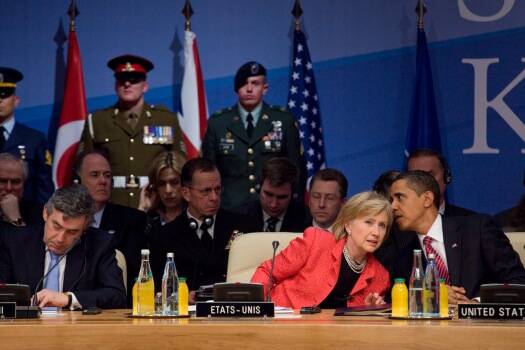The New York Times reported on Tuesday that Hillary Clinton “exclusively used a personal email account to conduct government business as secretary of state…and may have violated federal requirements that officials’ correspondence be retained as part of the agency’s record.”
Emails written and received by federal officials are considered government records, and federal law mandates that they be preserved for use by journalists, historians, and congressional investigators. There are exceptions for highly sensitive topics; the Times story quotes a former National Archives staffer offering a “nuclear winter” as a scenario where bypassing legal channels would be justified. Clinton’s successor as secretary of state, John Kerry, has used a government email account since taking office.
This revelation is not reassuring to those who fear a return to “Clinton drama” and intrigue if Hillary succeeds her husband in the White House. But it can’t be surprising to fans of political dramas on TV, a genre that has become popular only since the debut of The West Wing in 1999. Using a secret email account to get around the prying eyes of journalists and showboating congressmen—people who don’t understand the big picture, who just don’t have the best interests of the United States at heart—is the kind of brilliant move we’d expect from President Jeb Bartlet, or from characters on Scandal and House of Cards. Many of us love to watch The Good Wife’s Alicia Florrick wrestle with the ethics of bending the law to help a client, and we’d usually forgive her when she decides that the ends justify the means. How can we second-guess someone whose responsibility is greater than what most of us will ever bear?
A lot of political supporters will give Hillary Clinton the benefit of the doubt on this issue, but this kind of secrecy does not play as well in real life as it does on television. Fiction writers do not have a responsibility to historians, or to investigators charged with determining whether public officials broke the law or made decisions that could damage our international reputation. The email story is unlikely to cause Clinton any problems in securing the Democratic presidential nomination (a “nuclear winter” might reduce her odds a bit)*, but it feeds into a cynicism and distrust toward public officials that already corrodes our election system.
*Any argument that Clinton’s nomination is vulnerable must take into account the tacit deal that the first African-American nominee (Barack Obama) would be immediatelyfollowed by the first woman nominee. If you doubt that this deal exists, take a poll of acquaintances who voted for Clinton in 2008.








